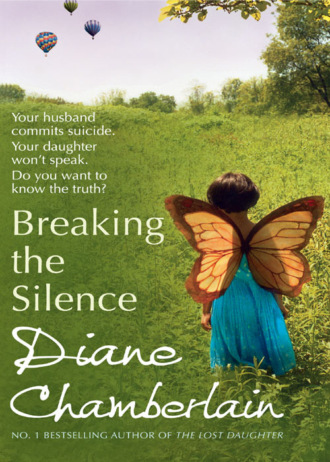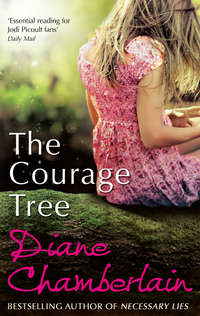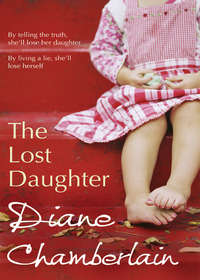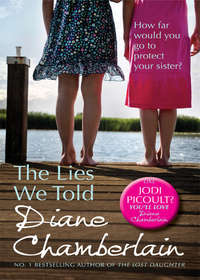
Полная версия
Breaking The Silence
Stuart was staying in the town house while he was in Leesburg, but he was staying there alone. Laura had barely been able to set foot in the house since finding Ray’s body. All evidence of his death had been scrubbed away by some people the police had recommended, but still, it was impossible to be there, to sleep there, without feeling Ray’s presence. Stuart, though, had no negative images attached to the town house. Besides, he told her, he would feel closest to Ray there.
Laura and Emma had been staying in the vacant, above-garage apartment of some friends. As soon as Laura could get things organized, she planned to move Emma and herself out to the lake house. She’d told the Smithsonian and Johns Hopkins she would be taking some time off, sending them scrambling to find replacements for her. She would probably sell the town house. She could not imagine ever living there again.
Nancy Charles, one of the geologists from the Smithsonian, stopped at Laura’s pew, leaning over to take her hand.
“I’m so sorry,” Nancy said. “How are you doing?”
“I’m okay.” Laura tried to smile.
“You just lost your father, and now dear Ray. It’s not fair.”
“No,” Laura agreed.
“How’s Emma?” Nancy asked. “She’s not here, is she?”
“She’s with a sitter.”
“Do you need any help with her?”
“No. Thanks, though,” Laura said. “It’s been rough on her, but she’s hanging in there.”
John Robbins, a minister who’d worked with Ray in creating programs for the homeless, stepped into the pulpit, and Nancy whispered goodbye. John began to talk, and although Laura struggled to listen, her mind was still on Emma, who had refused to come to the service. All the energy Laura had put into doing everything “right” with Emma after Poppa’s death had drained her, and she had no reserves left to help her daughter cope with this new tragedy. She was angry at Ray for piling a second loss on Emma in such a short time. And, of course, she felt guilty for her anger.
Emma had not uttered a single word in the four days since Ray’s death. A policewoman had spoken to her the day after it happened, her questioning gentle and sensitive. Emma had sucked her thumb, something she had not done in more than a year, as she stared blankly into the woman’s eyes. She’ll come around, the policewoman assured Laura. Laura should talk to her, she said. Draw Emma’s feelings about the trauma out in the open. But Laura could not get Emma to speak. Not through gentle coaxing, or sharing her own feelings, or even trickery. Emma had lost her voice.
It was Emma she thought of now, through speaker after speaker, until Stuart finally stood to deliver his eulogy. She found it difficult to look at her brother-in-law as he took his place in the pulpit; his resemblance to Ray was striking. He had Ray’s bulky body, his large, soft chin, straight nose and wire-rimmed glasses. Nearly the only difference was that Stuart still had a full head of dark hair, while Ray had lost much of his.
“Ray Darrow was a caring brother, a loving husband and father, a dedicated teacher, a volunteer committed to the homeless, and a writer of uncommon talent,” Stuart said. “He was my only brother, my only family, and he was also my best friend. He was the sort of person you could tell anything to, and he wouldn’t judge you or criticize you. As most of you know, his primary concern was the welfare of others. He was a good man, and the good are often those that suffer the most. Depression had been his enemy all of his life, and he bore frustration poorly. He bore failure poorly. He bore his inability to help others poorly. He wrote a book, No Room at the Inn, a beautiful work of art and compassion he hoped would draw attention to the plight of the homeless and the poor, but no one would publish it. It was decidedly unglamorous. And finally he could take it no more.”
Stuart bowed his head, and Laura could see that he was struggling for composure. She willed him to find it, even though she was losing it herself. Behind her, she heard sniffling.
Stuart continued. “Those of you here who are committed to the same causes that so moved my brother, please continue them in his name,” he said. “That is what he would have wanted.”
Later that night, Laura and Stuart sat together in the tiny living room of the above-garage apartment. Emma was already in bed, but the door to her bedroom was open to let in some light, and Laura spoke quietly in case she could hear them.
“I don’t think it was so much the book that made him kill himself,” she said. She was sitting next to Stuart on the love seat, facing the blue-curtained windows that looked out on her friends’ house. “I think it was me.”
“You?” Stuart said. “He thought the sun rose and set on you, Laurie. Don’t be crazy.”
“There was a lot going on you don’t know about.” She brushed a thread from the sleeve of her sweater. “I think that after I found the last comet, he began to feel like a failure. He kept getting rejection letters while I was getting funding for research and my picture in Newsweek and Time. I stayed at the observatory in Brazil for too long. I was very wrapped up in myself. Laura Brandon and her career. I left him alone too much.”
“I think he understood that was part of your job. He was very proud of you.”
“I don’t know, Stu. Right after my dad died, Ray and I had a big…well, he blew up at me.”
“Ray?”
“He sounded very resentful, of my job and my success. I think he must have been upset for a long time, but he’d hidden those feelings from me till then.”
“Well, if he was hiding them from you, he was hiding them from me, too. I never heard him say anything like that.”
The lights went on in an upstairs bedroom of her friends’ house. A family of five lived there, leading their nice, quiet, normal lives. Laura envied them.
“Even when I was home,” she said, “I’d be up with the telescope at night. He’d tell me how he woke up at 2:00 a.m. to find me gone, and that he missed me.” She blinked back tears. “I was selfish.”
“I don’t know,” Stuart said. “I can’t imagine Ray getting upset over your work. And definitely not over your success. He wasn’t the jealous type.”
“Maybe not when he was feeling well, but he’d been down for a while. I don’t think I recognized it. I should have picked up on it.”
“You’re being awfully hard on yourself, Laurie.”
“I didn’t tell you about the note he left.”
“You didn’t say there was a note.”
“I just didn’t want to tell you about it on the phone.” She didn’t want to tell him about it now, either, but knew she had to.
“What did it say?” Stuart shifted position on the love seat to see her better.
“It read, ‘I asked you not to go.’”
“What did he mean by that?”
“Well, it’s complicated.” Laura rubbed her eyes with her palms. “You see, there’s an elderly woman living near here in a retirement home, and—”
“The one your father asked you to take care of?”
“How did you know that?”
“Ray told me about her the last time I spoke with him on the phone. He said you were all gung ho about taking care of her, and he was very upset about it.”
“I think his being upset was way out of proportion to the situation, probably because he was so depressed. He wasn’t thinking clearly.”
Stuart hesitated. “It did seem an extreme reaction, I guess,” he said. “So, that’s what he was referring to in the note? That he’d asked you not to see her?”
“That’s right. But I had to, Stuart.” She turned to face him. “My father asked me to, and—”
“But…” Stuart interrupted her. “Your father was dead and never would have known the difference.” He spoke gently, as though he had no idea how those words would cut her. “Ray was alive. For whatever reason, he needed to know that what he thought and what he wanted mattered to you.”
She didn’t know what to say. She’d thought Stuart would understand.
“So you saw this woman?” he asked.
“Yes. I still don’t know why my father wanted me to, though. She has Alzheimer’s and doesn’t remember him at all.”
“Alzheimer’s, huh?” Stuart actually chuckled.
“I don’t see what’s so funny.”
“You’re right. It isn’t funny.” Stuart sobered, but it looked as if it took some effort. “Do you plan to see her again?” he asked.
“I don’t think so.” Laura shivered at the thought. Her last visit to Sarah Tolley was linked in her mind to Ray’s death.
“Good,” Stuart said. “Is she getting good care there?”
“I think so.”
“Then forget about her. You made sure she’s all right. You’ve done all you need to do. You found no meaningful link between her and your father. Leave it alone.”
Stuart was right. Her father’s money was still in trust for Sarah, and the attorney would handle any bills that came in. There was nothing more for Laura to do. She remembered the attendant, Carolyn, telling her how much Sarah would love to be able to go for walks again and have someone to talk to, but she quickly blocked that thought from her mind.
Stuart stood up with that same getting-to-his-feet groan Ray had always emitted when rising from a chair. “I’m going to head back to the town house,” he said, stretching. “It’s been a long day.”
Laura stood up herself and walked him to the door, where Stuart pulled her into a brotherly embrace.
“Ray made a lot of sacrifices for you, you know,” Stuart said.
She nodded, her head resting on his shoulder.
Stuart kissed her cheek, then walked out the door. Laura sat down again on the love seat.
Ray made a lot of sacrifices for you.
It hurt to think about all Ray had done for her. He’d given her the financial and emotional support she’d needed to further her career. He’d loved her through her successes despite his own failures.
And he’d even taken responsibility for the child she had never meant to conceive.
Конец ознакомительного фрагмента.
Текст предоставлен ООО «ЛитРес».
Прочитайте эту книгу целиком, купив полную легальную версию на ЛитРес.
Безопасно оплатить книгу можно банковской картой Visa, MasterCard, Maestro, со счета мобильного телефона, с платежного терминала, в салоне МТС или Связной, через PayPal, WebMoney, Яндекс.Деньги, QIWI Кошелек, бонусными картами или другим удобным Вам способом.









